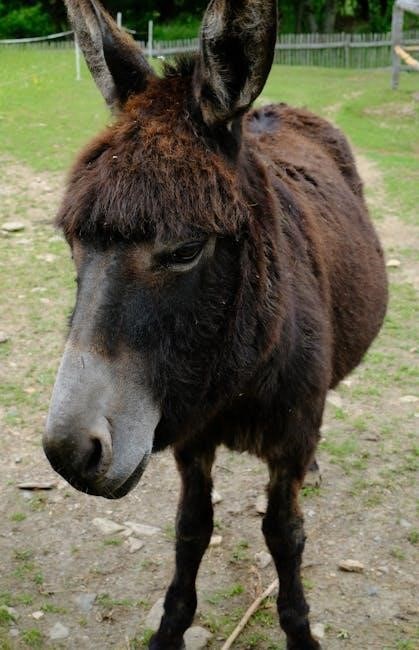George Orwell’s Animal Farm is a timeless allegorical novella published in 1945. It tells the story of barnyard animals rebelling against their tyrannical owner, Mr. Jones, to establish a utopian society.
The novel serves as a critique of totalitarianism and the corruption of power, reflecting Orwell’s concerns about Stalinism and the Russian Revolution. Its universal themes remain relevant today.
Readers can access Animal Farm in PDF format through legal sources like online libraries, eBook platforms, or educational websites, ensuring a convenient way to explore this classic dystopian tale.
The novella’s enduring popularity lies in its simple yet profound storytelling, making it a must-read for anyone interested in political satire, history, or literary classics.
1.1 Overview of the Book
Animal Farm, written by George Orwell, is a novella published in 1945. It narrates the story of a group of barnyard animals who rebel against their oppressive owner, Mr. Jones, to establish a utopian society. The animals, led by pigs like Napoleon and Snowball, aim to create a system based on equality and justice. However, the ideals of the revolution gradually erode as power corrupts the leaders, leading to a dystopian outcome. The book is a powerful allegory of the Russian Revolution and the rise of totalitarianism, with each character symbolizing historical figures or groups. Orwell’s concise yet profound storytelling makes Animal Farm a timeless critique of political corruption and the abuse of power. Readers can access the book in PDF format through legal sources, ensuring easy exploration of this classic tale.
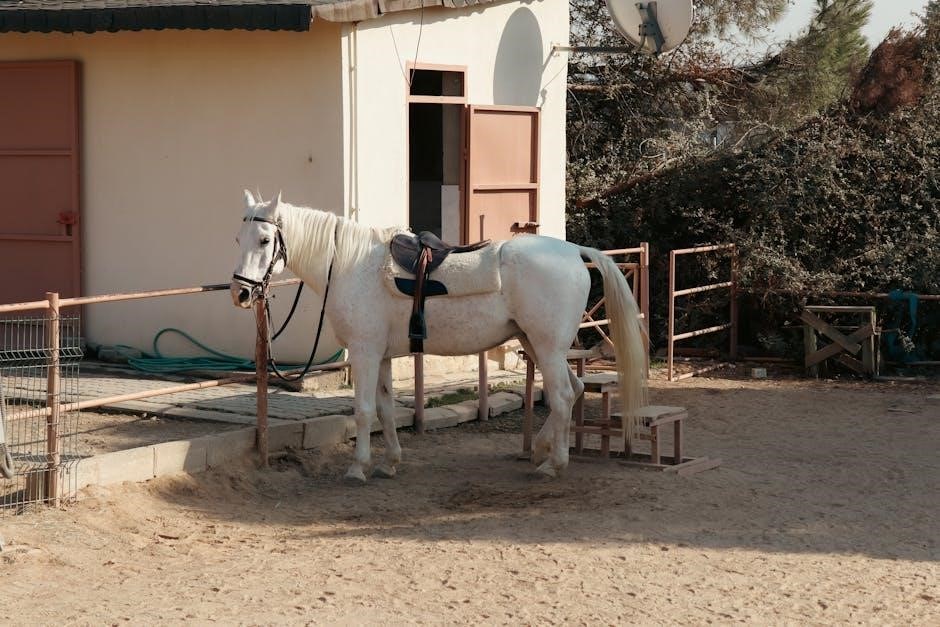
1.2 Historical Context and Allegorical Meaning
George Orwell’s Animal Farm is a profound allegory of the Russian Revolution and its aftermath. The novella mirrors the events of 1917, when the Bolsheviks overthrew the Tsar, and the subsequent rise of Stalin’s totalitarian regime. The farm represents Russia, with animals symbolizing key figures and groups. Napoleon embodies Stalin, Snowball represents Trotsky, and the pigs symbolize the Communist Party. The story critiques how power corrupts ideals, as the pigs gradually betray the revolution’s principles. Orwell’s fable highlights the dangers of authoritarianism and the erosion of equality. The book’s historical context is crucial to understanding its themes, making it a powerful commentary on political corruption. Readers can explore this allegory in PDF format, available through legal sources, ensuring easy access to Orwell’s timeless critique of totalitarianism.
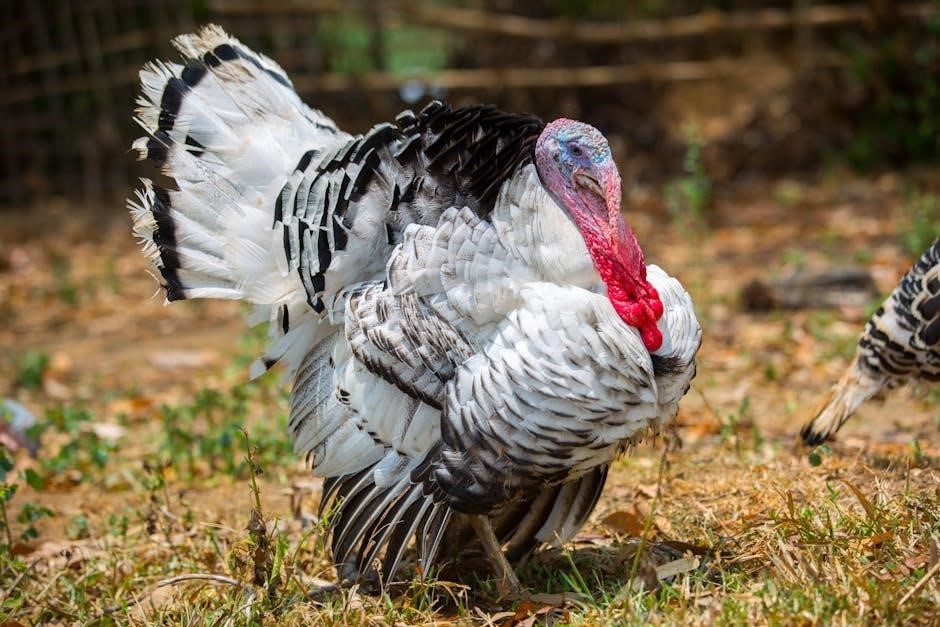
Themes and Symbolism in “Animal Farm”
Animal Farm explores themes like the corruption of power, betrayal of ideals, and illusion of equality. The pigs symbolize the Communist Party, while the barn represents the manipulated ideals of the revolution.
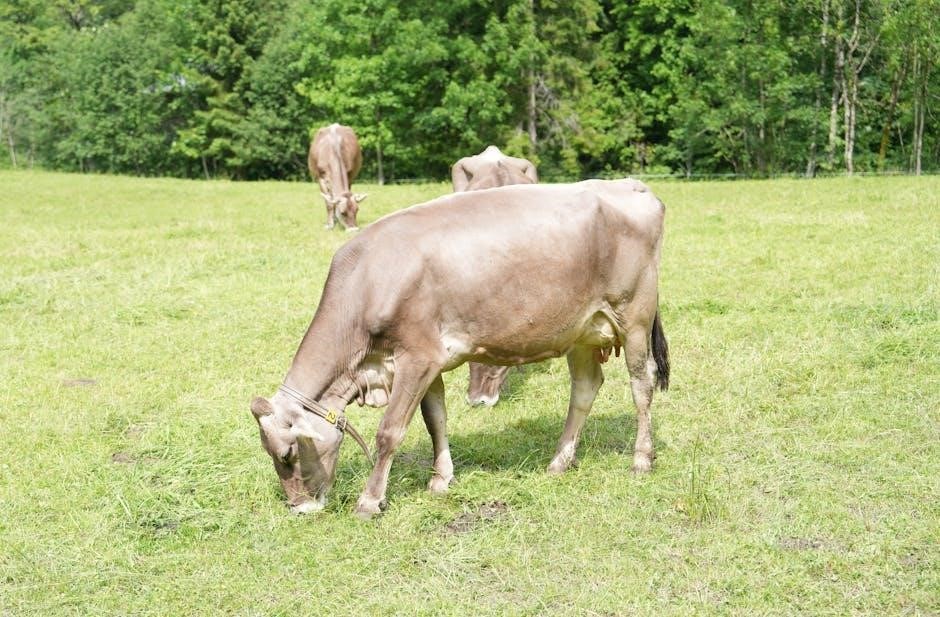
2.1 The Russian Revolution and Its Representation
Animal Farm is a powerful allegory of the Russian Revolution, with Orwell drawing parallels between the rise of communism and the animals’ struggle for equality. The novella mirrors key events, such as the overthrow of Tsar Nicholas II (symbolized by Mr. Jones’ expulsion) and the subsequent power struggle between Lenin and Trotsky, represented by Snowball and Napoleon. The pigs, led by Napoleon, embody the Communist Party, while the working-class animals, like Boxer the horse, symbolize the exploited proletariat. Orwell critiques Stalin’s authoritarian regime, illustrating how ideals of equality are corrupted by power. The Seven Commandments, later altered by the pigs, reflect the manipulation of revolutionary principles. The novel serves as a cautionary tale about the dangers of totalitarianism and the erosion of democratic ideals. Orwell’s depiction of the revolution’s aftermath highlights the cyclical nature of oppression, as the animals’ newfound “freedom” devolves into tyranny under Napoleon’s rule.
2.2 The Corruption of Power and Ideals
Animal Farm vividly portrays the corruption of power and ideals through the transformation of the pigs, particularly Napoleon. Initially united under the principles of equality, the pigs gradually abuse their authority, manipulating the Seven Commandments to justify their indulgence in privileges like drinking alcohol and sleeping in beds. This moral decay mirrors the ways in which power can corrupt even those with noble intentions. Napoleon’s rule becomes tyrannical, with propaganda and fear used to maintain control, silencing dissenters like Snowball. The working-class animals, such as Boxer, are exploited for their labor, highlighting the betrayal of the revolution’s original ideals. Orwell critiques how power can erode moral integrity, turning revolutionaries into oppressors. The novella serves as a timeless warning about the dangers of unchecked power and the erosion of democratic principles, illustrating how ideals can be distorted to serve the interests of those in control.
Key Characters and Their Roles
Napoleon leads the pigs, manipulating power to dominate. Snowball represents idealism, while Boxer symbolizes loyalty. Benjamin embodies wisdom, observing the corruption of ideals without involvement.
3.1 Napoleon, Snowball, and the Pigs
Napoleon and Snowball, two pigs, emerge as leaders in Animal Farm, symbolizing the rise of power and ideological conflict. Napoleon, cunning and manipulative, represents authoritarianism, while Snowball embodies idealism and revolutionary principles. Their rivalry mirrors historical political struggles, with Napoleon eventually expelling Snowball to consolidate power. The pigs, led by Napoleon, gradually corrupt the revolution’s ideals, exploiting their intelligence and position to manipulate the other animals. They alter the Seven Commandments to justify their actions, such as “All Animals Are Equal / But Some Animals Are More Equal Than Others.” This reflects the theme of power’s corrupting influence and the betrayal of original ideals. The pigs’ actions highlight Orwell’s critique of totalitarianism and the dangers of unchecked authority. Their role in the novella underscores the tragic transformation from rebellion to tyranny, serving as a cautionary tale about the abuse of power and the erosion of trust.
3.2 The Animals and Their Symbolism
The animals in Animal Farm are carefully crafted to symbolize various groups and individuals from the Russian Revolution and broader societal contexts. The pigs, led by Napoleon and Snowball, represent the Communist Party leaders, with their corruption and power struggles mirroring historical figures like Stalin and Trotsky. The horse Boxer, with his dedication and strength, symbolizes the working class, while Benjamin the donkey embodies the skeptical intelligentsia who see through the propaganda. The sheep represent the ignorant masses, easily swayed by slogans like “Four Legs Good, Two Legs Bad.” Even the farm itself serves as a microcosm of society, illustrating how power dynamics and corruption can distort even the noblest ideals. Through these characters, Orwell critiques not only the Russian Revolution but also the universal tendencies of human nature. The animals’ roles and fates provide a powerful allegory, making the novella a timeless commentary on political and social issues.
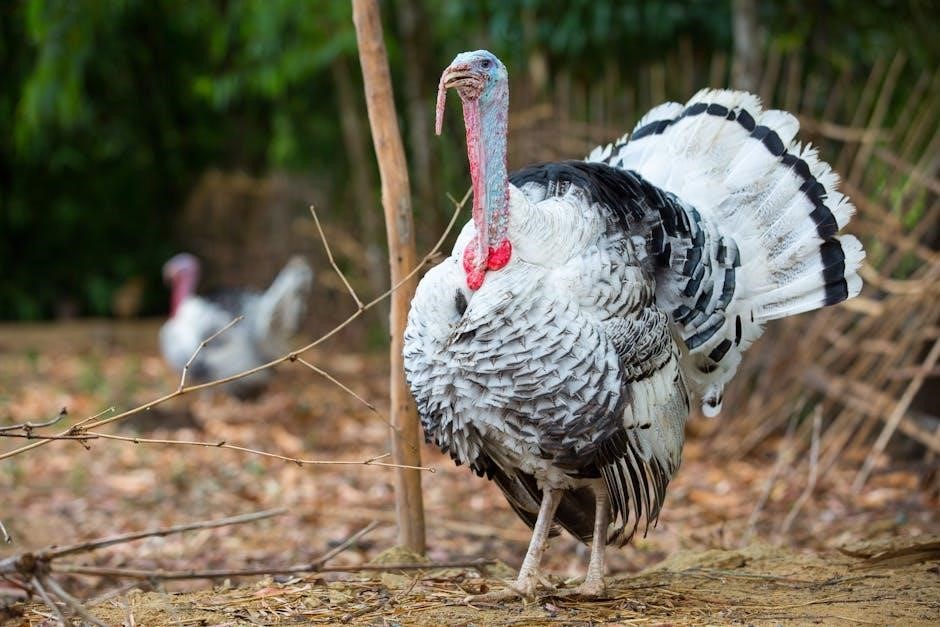
Where to Find “Animal Farm” in PDF Format
Animal Farm in PDF can be downloaded from legal sources like eBookstores, libraries, or educational websites. Ensure the source is trusted to avoid unauthorized or unsafe downloads. Always verify the publisher’s credentials for authenticity.
4.1 Legal Sources for Downloading the Book
To legally download Animal Farm in PDF format, consider trusted sources like Amazon Kindle, Google Books, or Barnes & Noble. These platforms offer secure and authorized downloads for a small fee.
Additionally, many educational websites and libraries provide access to the book through subscription services like Scribd or Hoopla. Ensure the source is reputable to avoid unauthorized versions.
Some free legal options include Project Gutenberg or ManyBooks, which offer classic works in digital formats. Always verify the publisher’s credentials to guarantee authenticity and legality of the download.
4.2 Free Resources and Libraries
Accessing Animal Farm for free is possible through reputable libraries and educational platforms. Many public libraries offer free e-book rentals via services like OverDrive or Hoopla, requiring only a library membership.
Project Gutenberg and ManyBooks provide free access to classic works, including Orwell’s novella, in PDF and EPUB formats. These platforms cater to readers seeking legal, cost-free downloads.
Additionally, some universities and online archives offer free access to Animal Farm for educational purposes. Always verify the source’s legitimacy to ensure compliance with copyright laws and avoid unauthorized versions.
